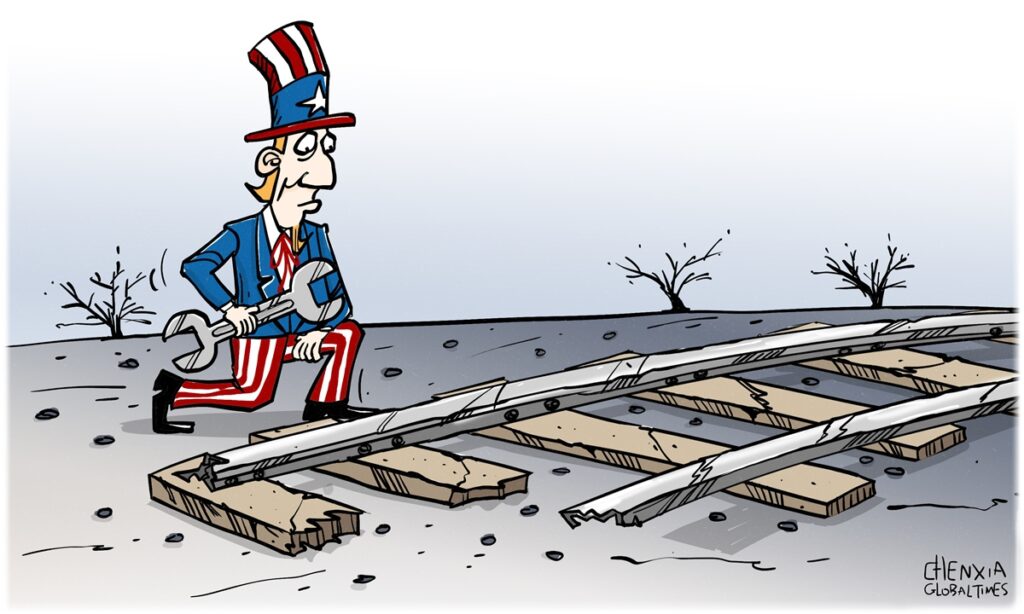As the US advances its Middle East railway plan during the ongoing Group of 20 (G20) Summit over the weekend in India, Chinese experts express doubts about its credibility and feasibility as it is not the first time that Washington has initiated pledges for other countries and regions, only for those initiatives to lose momentum.
Furthermore, experts believe that the US’ true aim to isolate China in the Middle East, whose cooperation with the region is gaining momentum over recent years, will not bear any fruit.
The comment followed a media report claiming that US President Joe Biden and the leaders of India, Saudi Arabia and the United Arab Emirates (UAE) aim to announce a joint infrastructure deal on Saturday that would establish a network of railways connecting Gulf and Arab countries.
According to US media outlet Axios, citing sources, the joint railway project is expected to be one of the key deliverables Biden wants to achieve during the G20 Summit, although the specific details of the project have not been disclosed.
The idea of the network initially emerged at the I2U2 Business Forum, launched in 2021 by the US, India, Israel and the UAE to discuss infrastructure projects in the Middle East. Saudi Arabia later joined the discussions.
Zhou Rong, a senior researcher at the Chongyang Institute for Financial Studies at Renmin University of China, told the Global Times on Saturday that the US lacks both the genuine intention and the capability to follow through on its pledge to truly enhance the transportation network in the Middle East.
“It is not the first time that the US has been involved in a ‘much said, little done’ scenario,” Zhou said.
During the Obama administration, then US secretary of state Hillary Clinton announced that the US would sponsor a “New Silk Road” that would emerge from Afghanistan to better link the country with its neighbors to increase its economic potential, but the initiative never materialized.
The Biden administration’s Middle East infrastructure plan is an apparent effort to counter the China-proposed Belt and Road Initiative (BRI), which is celebrating its 10th anniversary this year with numerous fruitful projects across various countries and regions. “The Biden administration is apparently again engaging in bloc politics and ganging up to form anti-China cliques,” Zhou said.
“The recent moves by the US in the Middle East are more reactive than proactive given China’s stronger presence,” Liu Zhongmin, a professor at the Middle East Studies Institute of Shanghai International Studies University, told the Global Times on Saturday.
China has been engaging with the Middle East through the BRI for years. Its peacemaker role in the Saudi-Iran detente has been lauded by the international community, countries in the region in particular, and has injected momentum of stability to the region.
In areas such as infrastructure construction, cooperation between the Gulf countries and China has advanced significantly in recent years. “It is impossible for the US to create a hedge over the short term,” Liu said.
Zhou described the US’ plan as “more of a symbolic gesture. “From a technical perspective, the US’s decision to focus on transport infrastructure, an area where it lacks expertise, in an effort to salvage its declining influence in the region, suggests that the highly touted plan may hardly achieve its desired results.
“In terms of the technology and costs of building railways, no country in the world than China has a more prominent advantage. What the Middle Eastern countries want from the US is not just a railway, but also security. However, the US has neither provided nor been able to bring security to the region; instead, it has complicated the security situation there. This is the dilemma the US is facing in the Middle East,” Ding Long, a professor with the Middle East Studies Institute of Shanghai International Studies University, told the Global Times.
For Middle Eastern countries that will participate in the US-led railway initiative, there is no concern that their ties with China will weaken just because of the deal, instead, they will continue maintaining close cooperation with the world’s second-largest economy, Zhou said.
“In fact, the US’ ability to influence its allies in the Middle East is shrinking, and Saudi Arabia and the UAE have recently joined the BRICS cooperation mechanism. I think the two countries will exercise prudence in the issue,” Liu said.
“China welcomes all initiatives that can help pool synergy and promote global infrastructure development. Any calculation to advance geopolitics in the name of infrastructure development will win no support and will never succeed,” a spokesperson for Chinese Foreign Ministry said in June 2022 on the US’ plan to roll out a new infrastructure plan to counter the China-proposed BRI.
There are no such thing as different initiatives countering or replacing each other. The world needs more bridges to be built rather than torn down, more connectivity rather than decoupling or building fences, and mutual benefits rather than isolation and exclusion, the spokesperson said.




